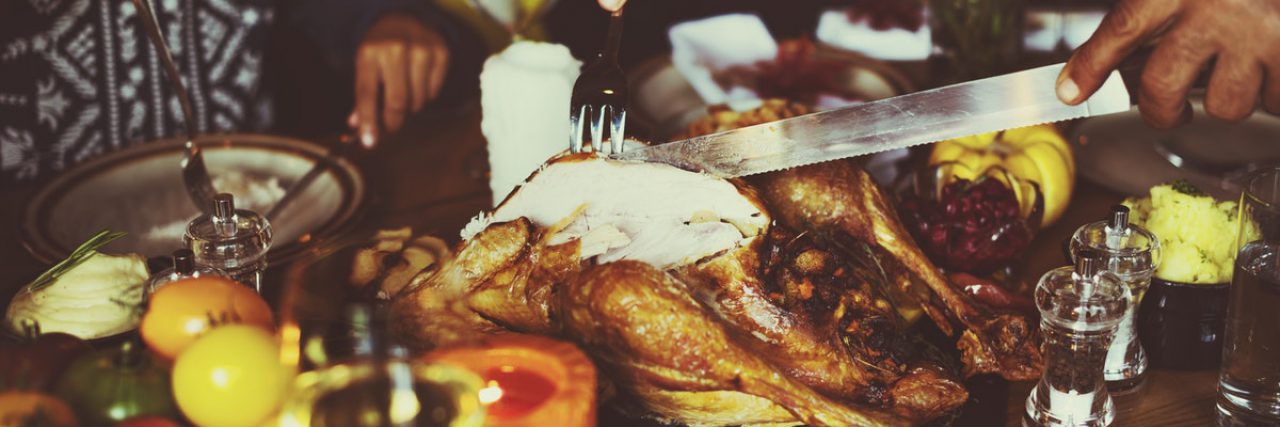
Maia Elliott, Analyst and Review Writer for the Global Food Security Programme, and Professor Tim Benton, Distinguished Visiting Fellow at Chatham House, explore how rekindling community spirit at Christmas can make our feasting healthier for ourselves and for the planet.
For many of us, as soon as we think of Christmas Day our mouths water in anticipation. A fat turkey full of delicious stuffing and ample amounts of cranberry sauce, roasted winter vegetables smothered in gravy, and a seemingly unlimited supply of warm mince pies and wine. Whether you consider the Christian tradition or its pagan roots, mid-winter celebrations have always included a lavish feast as the festival’s centre-piece.
In a time of climate change and dwindling natural resources, it’s unsurprising that every year we’re hearing more about the environmental impacts of our festive foods. Over-purchase and over-preparation results in the UK throwing away 230,000 tonnes (or £1 billion) of food each Christmas, half of which is still edible at the time [1]. Other concerns focus on the spike in energy consumption around Christmas, as the combined energy used to cook our Christmas dinners is estimated to have an equivalent carbon footprint to driving a car around the world 6000 times. The widespread consumption of packaged Christmas foods generates considerable plastic waste per household, and unlike the traditional family turkey that was fed on food scraps all year before the Christmas chop, the 10 million turkeys we now consume each Christmas are fed on grain that is fit for human consumption, and 90% are intensively farmed [2].

However, the costs are not just environmental. The average British citizen consumes 6000 calories on Christmas day in the form of calorie-dense Christmas foods and drinks that are relentlessly mass marketed to us from November onwards. With a recommended daily intake of 2000-2500 calories and 26% of UK adults now classified as obese, it’s clear that overeating on this scale is contributing to the obesity crisis [3]. Another societal problem is social isolation, with half a million older people expecting to feel lonely this Christmas [4]. Besides the emotional pain, loneliness has been associated with increased risk of cardiovascular diseases, depression and dementia [5-7], which all put considerable strain on our National Health Service.
Given all the above, one might wonder whether we should be advocating a future mid-winter festival that is more austere, healthier and more sustainable than our current practices. In light of how our meat consumption contributes to climate change and modern diseases, perhaps our future Christmas feasts should consist of small portions of plant proteins, and maybe Christmas Day will become a day like any other in our increasing secular society?
No. But here’s a heretical alternative: Let’s put the festival back into the feast.

In the past, feasting fostered a strong sense of community, bringing together family, friends, neighbours and strangers. Today, however, we live in an atomised society, where many families are split due to relationship breakdown or distance, neighbours are separated by busy roads, colleague relationships are confined to the workplace, and most of us express little interest in connecting with the people around us, who remain strangers. As a result, we tend to spend Christmas Day in smaller gatherings of people we already know well, instead of forging new bonds.
Building on the concept of circular food systems, imagine community get-togethers at Christmas, where food is prepared and eaten together, meals and leftovers are shared, social links are forged and communities build and support each other. This kind of feasting not only honours the age-old tradition of mid-winter celebrations, but it also provides a host of opportunities to make Christmas feasting healthier and more sustainable.

Divvying up the food preparation responsibilities between different households is generally more cost-efficient, energy-efficient and less stressful. This approach also increases the feasibility of serving a completely home cooked feast, which reduces the amount of ultra-processed food and plastic packaging waste. Bringing new people together fosters conversation during the meal, which slows down eating and reduces overconsumption. More mouths to feed generally reduces the amount of leftovers, and allows leftovers to be distributed amongst guests in manageable amounts, so no one finds themselves inundated with leftover food that will end up in the bin, whilst other families struggle to feed themselves.
But the biggest benefit to embracing community spirit this Christmas is not practical – it’s social. A Christmas meal is an opportunity to be altruistic, form new bonds with members of our community, and lift someone from social isolation at the worst time of year to be alone. In the words of Charles Dickens: “No one is useless in this world who lightens the burdens of another”. So this year, for ourselves and for the planet, let’s rekindle the Roast of Christmas Past.
References:
- Digital Library: This festive waste [waste management]
- Eating better: Less, better and more delicious this Christmas
- NHS Digital: Statistics on Obesity, Physical Activity and Diet – England, 2018 [PAS]
- Age UK: As Christmas approaches, Age UK finds 1.7 million older people in England haven’t met up with a friend in a month
- NCBI: Loneliness as a specific risk factor for depressive symptoms: cross-sectional and longitudinal analyses.
- Heart: BMJ Journals: Loneliness and social isolation as risk factors for coronary heart disease and stroke: systematic review and meta-analysis of longitudinal observational studies
- Journal of Neurology, Neurosurgery and Psychiatry: Feelings of loneliness, but not social isolation, predict dementia onset: results from the Amsterdam Study of the Elderly (AMSTEL)



